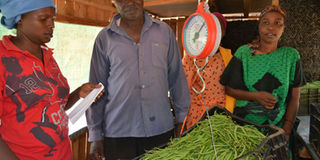French beans spread cheer in arid North

Bidii Self-Help Group members in Isiolo weigh French beans ahead of export. PHOTO | ISAIAH ESIPISU | NATION MEDIA GROUP
What you need to know:
- Members bought a piece of land where they built the office that also works as a collection and packaging centre for their fresh produce, and have opened a bank account for every member through which they get paid.
- Crop farming has proved to be an excellent source of livelihood for the community that initially relied on livestock.
- Farmers start streaming in around 2pm with their French beans harvest. In the structure owned by Bidii Self-Help Group, there is a weighing scale and a charcoal cooler where the beans are stored, among other items.
The wooden structure at Kambi ya Sheikh Village on the outskirts of Isiolo Town is always a beehive of activity every fortnight.
Farmers start streaming in around 2pm with their French beans harvest. In the structure owned by Bidii Self-Help Group, there is a weighing scale and a charcoal cooler where the beans are stored, among other items.
“We started the group of 25 as a merry-go-round three years ago, before we moved to a Farmer Field School (FFS). We have now grown, joined other groups and formed a cooperative through which some of our produce ends up in the export market,” chairperson and mother of five, Sadia Ibrahim, says.
FFS is a concept of the UN Food and Agriculture Organisation in which farmers learn through field observations and experimentation on designated pieces of land.
However, Bidii group has overgrown the field school stage to become independent. It now generates income from horticulture, fish farming, apiculture (bee keeping) and rabbits, which do not attract bandits.
They store their fresh produce in a simple cooler made of charcoal packed between wire mesh. When water is poured around it, it leaves a cooling effect inside the “charcoal room”, preserving the fresh produce for hours.
French beans export is their main income earner, followed by vegetables and fruits, which are sold locally,” Sadia says.
ActionAid International Kenya official Jamlick Mutie, whose charity is implementing FFS in Isiolo, says the main aim of the project was to offer communities (most of which are pastoralists) an alternative source of livelihoods following spates of cattle rustling.
With the French beans project flowering, Bidii has moved away from aid, and it has now employed an accountant, whom it pays Sh10,800 every month.
WATER FOR IRRIGATION
Members bought a piece of land where they built the office that also works as a collection and packaging centre for their fresh produce, and have opened a bank account for every member through which they get paid.
“We export our beans every fortnight to Europe, but we pay our farmers every month,” group treasurer Mary Mulwa says. “Our highest paid member earns an average of Sh27,000 every two weeks, and the lowest Sh3,000. The exporters buy a kilo of French beans at Sh80.”
Their first request from the NGO was water for irrigation.
“We mobilised all members to help in digging the trenches, and laying in the pipes all the way from River Kalili some 15km away to Kambi ya Sheikh,” Sadia recounts.
The water became a key resource, which the farmers who stay in different villages, use on rotation basis.
Crop farming has proved to be an excellent source of livelihood for the community that initially relied on livestock.
“We lost many of our animals to drought and cattle rustlers. But we have now put that behind us because the rustlers are not interested in beans,” a group member, Kuresha Muhammed, says.
Bidii is part of the 16 groups that came together to form Isiolo Smallholder Farmers’ Cooperative Society Ltd. Through the group, individual farmers or groups can borrow money from banks.
The farmers are the first ever group from the semi-arid region to sell horticultural produce abroad.





